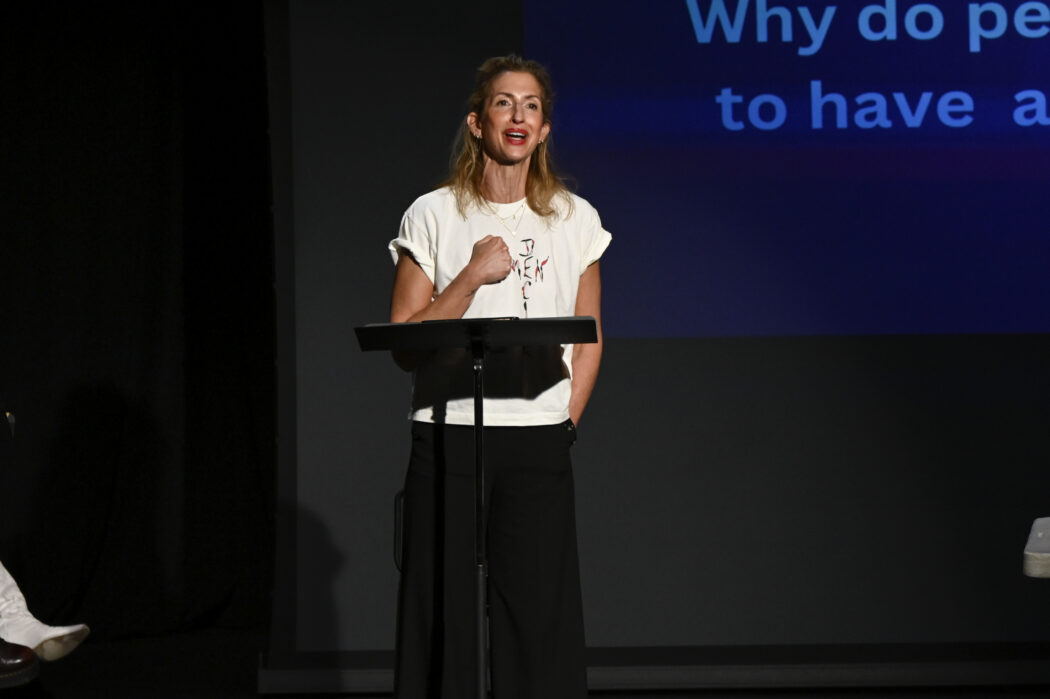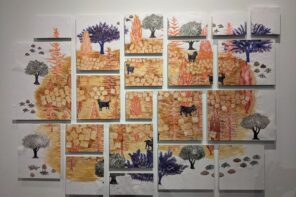With over thirty performances of the Turnaway Play, the scientifically Turnaway Study, gives new life to the often taboo topic of abortion in a way that resonates with everyone.
Alysia Reiner on Art, Activism, and the Fight for Bodily Autonomy
In a time when women’s rights, LGBTQIA+ protections, and the fundamental freedom to make choices about our own bodies are under attack, art has emerged as one of the most powerful forms of activism. The Turnaway Play—a dramatic, unflinching look at the impact of abortion restrictions—has become more urgent than ever. For actress, producer, and activist Alysia Reiner, stepping onto the stage for this project was not just about performance. It was about truth, power, and an unwavering commitment to justice.
Reiner, best known for her roles in Orange Is the New Black, Ms. Marvel, and The Diplomat, has long been an advocate for gender equity and reproductive rights. When asked what drew her to The Turnaway Play, her answer was simple yet profound: “Abortion rights are human rights. Art is my favorite form of activism.”
And activism was palpable the night of her performance at the off-Broadway SoHo Playhouse.
The Energy in the Room: A Rallying Cry
“Electric,” Reiner says, describing the charged atmosphere. It was an evening where art met urgency, where storytelling transformed into action. The audience felt it. They hollered, clapped, and celebrated a monologue so powerful it transcended performance—it became a call to arms.
As a mother, a woman, and an actor, Reiner connected deeply with The Turnaway Play. “I want my child to have bodily autonomy and full freedom of choice and access to all forms of care. I want that for all humans.” Her portrayal of a woman whose research showed how access to abortion changed the course of so many lives underscored an undeniable truth: the statistics behind the Turnaway Study aren’t just numbers. They are lived experiences, and the consequences of restrictive policies are devastating.
From Study to Stage: The Creative Process
For playwright Lesley Greene, adapting the Turnaway Study into a play was both a challenge and an opportunity. “It was hard to know how to turn a scientific study into a play!” she admits. “I tried lots of different things. In the end, I created a world that was part drama and part documentary, but not a typical docudrama.”
The play blends fiction and reality, featuring a character based on Dr. Diana Greene Foster—Lesley’s sister and the researcher behind the Turnaway Study. This fictionalized version of Foster interacts with the audience, weaving together study results, family stories, and contemporary political realities. The play also includes testimonials from real women who participated in the study. “Their words pack a punch!” Greene says.
For Greene, the significance of her sister’s research is clear: “She took a subject that people had lots of opinions on despite the fact that there was no good data. And she got the data. She found out that when you limit people’s abortion access, there is a real cost to their lives.” The Turnaway Study proves that restricting access to abortion doesn’t just force people to carry unwanted pregnancies—it affects their health, economic stability, and overall well-being.
It was Foster’s idea to have her sister create a theatrical adaptation of The Turnaway Study, and Lesley agreed without hesitation. Both say that it was a powerful experience. . “I was SO excited to have Lesley write a play about my study. First of all, I know that not everyone reads our 50 scientific papers or a Supreme Court amicus brief. A play can reach a new audience. Also, she’s my big sister, so I am not beyond the thrill of having her pay so much attention to me!” The collaborative process became a family affair, with Foster acting as the first reader for most of the play. She and Lesley even spent days in California arranging and re-arranging scene descriptions on post-its, searching for the best way to structure the story.
(Thank you to Alysia Reiner, Ginger Gonzaga, Natasha Estrada, Lesley Greene, Diana Greene Foster, Daniel Arcana, Annabel Sheinberg, and our entire Turnaway Project team.)

Bringing the Play to the Frontlines
If given the opportunity to perform The Turnaway Play anywhere in the country, Reiner doesn’t hesitate: “Arkansas. The abortion ban there includes rape and incest.”
It is a tragic irony that her first job after college—one that granted her access to actor’s union healthcare—was at the Arkansas Repertory Theatre. Now, the same state denies women the right to make critical choices about their own bodies. It is places like these where the play is most needed. Where stories must be told, where awareness must be raised, where hearts and minds might still be changed.
Greene shares that her ultimate goal is for The Turnaway Play to reach people all across the country, but especially in areas where abortion is severely restricted or banned. “The play has had over thirty readings so far, and it has led to great discussions about the impact of unwanted pregnancies on people’s lives. I would like this play to bring people together to get the facts, to experience solidarity in this difficult time, and to feel mobilized to advocate for improved abortion access in their state and the nation.” As a result, Greene has made the Turnaway Play available for free to those that want to participate in and host a reading or performance in their community.

Memorable Moments and the Power of Storytelling
Both Greene and Dr. Foster recall the powerful emotions of seeing the play come to life for the first time. “Sitting with my sister at the first preview performance of the play at Ithaca’s Kitchen Theatre Company was an unforgettable experience. We kept looking at each other in disbelief. It was so good! We may have cried a few times too, I’m not saying.”
For Foster, the play exceeded her expectations. “I have read versions of the play all along and, truthfully, each time I read it, I cry. But there’s something even more powerful seeing it on the big stage and hearing an audience react.” She attended multiple performances, including the workshop reading in Ithaca, a staged reading in Hartford, and nearly every full production at the
Kitchen Theatre in May 2024. “The play has more than surpassed my greatest hopes about reaching new audiences with stories that have the potential to open people’s minds and increase empathy.”
For Reiner, the most moving moment of the night wasn’t on stage, but afterward. An audience member—a lifelong advocate and clinic worker—was so deeply affected by the performance that she was moved to tears.
That moment of connection is exactly why Reiner hopes to see The Turnaway Play have a long, successful run off-Broadway with a rotating cast, bringing these urgent stories to an even broader audience.
Beyond the Stage
As the Turnaway Project continues to expand, Dr. Foster warns that its message is more crucial than ever. “We need to understand why people seek abortions and what happens if they cannot [access abortion care]. Because I fear that this new administration will try to make abortion even more difficult to access.”
To amplify the impact, the project provides accessible resources for organizing readings nationwide. Greene and her team offer guidance on casting, venues, marketing, and calls to action, making it easy for communities to use the play as a tool for advocacy, fundraising, and solidarity.
While The Turnaway Play is a defining moment in Reiner’s activism through art, her work is far from over. With a long list of upcoming projects, including her recent film Ramona at Midlife, she continues to push boundaries and use her platform to advocate for change.
As we navigate this political storm, one thing is clear: the fight is far from over. And with voices like Reiner, Greene, and Foster leading the charge, the movement is only getting louder.



















